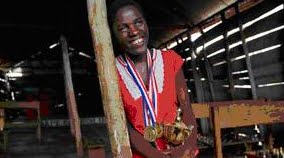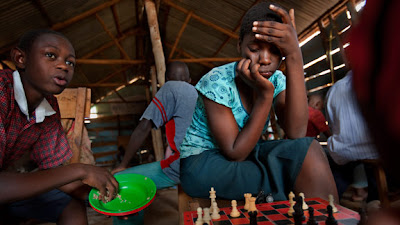Phiona Mutesi is currently a member of the 9-person, Ugandan female chess team, the Mulago Queens. Here, she is just part of the team, even though she is the youngest and had the most remarkable journey to playing chess competitively at the International level. Chess is a sport dominated by white males, yet Phiona is a poor, under-educated black girl from the slums of Uganda and has successfully competed in International tournaments.
She learns strategic moves very quickly, but then you have to be quick to survive. She plays chess faster and more aggressively than most people have ever seen before. Life on the streets is hard. You learn to move quickly, attack ruthlessly and always be prepared defensively. Welcome to street chess in Kampala where a 30 second timer still is too slow.
The Ugandan Chess Federation (UCF) is linked to the World Chess Federation (FIDE) and is responsible for setting up competitions and linking Ugandan chess players to chess players around the world. The UCF was founded in 1972 and became the first Federation in the East African nations to get affiliated to FIDE in 1978.
The objectives of the UCF are to promote interest in the game of chess, and to raise the standard of play of this game in all communities of Uganda. They hope to do this by forming chess clubs and organizing tournament.
Phiona Mutesi may be Uganda’s best female chess player. She may even be the best in Africa, but one thing she isn’t and that is a conventional player. Her age was reported to be between 15 and 18 when she competed in the Chess Olympiad in Siberia last September.

Phiona Mutesi
Mutesi is certainly the unlikeliest person to be a chess champion since she lives in a Kampala slum, and is just learning to read. She was attracted to the game at age nine, after her brother learned the game from Robert Katende of the U.S. charity Sports Outreach Institute. In less than a year, she was beating Katende himself. Mutesi entered and won her first Uganda women's junior championship in 2007, when she was 11.
In 2009 Mutesi and two boys from Katwe travelled to South Sudan, for a 16 country regional tournament. It was the first time she was on a plane. All 3 of them won their games, and Mutesi won the girls title. The win presented an unusual problem. When you live in a one room shack, where do you put the trophy? Even more troubling, is how to prevent it from being stolen. By the end of 2009, she had won several regional tournaments. In 2010, she competed in the Chess Olympiad in Siberia, where she was beaten by Dina Kagramanov, the Canadian champ, who gave her advice and books on advanced chess. She won the Junior Women’s title three years in a row, and it was the favorite to win it a forth time, but the Uganda Chess Federation didn't have the funds to host the competition in 2010 or 2011.
Mutesi continues to improve, and she has a winning attitude. She said, “In chess, it doesn’t matter where you come from, only where you put the pieces.”
Getting there wasn’t easy. In the beginning, their small local group in the slums didn’t want to accept a female in their sport. Thanks to her brother and Katende, she learned the game quickly and was not only competitive, but was beating the best players in their group. Within a year she was also beating her coach on a regular basis. It was time to move on and compete with players from more affluent schools and universities. In 2005, the group from the Katwe slum was allowed to enter the national junior championships. There was initial resistance because the tournament was for school children and not street kids. The wealthy students had nothing to gain by playing against a raggedy group from the slums. Many competitors also refused to play against the girl from the slums. When she had the opportunity to play, she literally knocked their socks off. Ghetto chess is played a little different than the slow paced game with plenty of concentration and well thought out moves most people know. A 30-second timer is often too slow in Ghetto chess, where the pace is extremely quick, the moves are aggressive and the noise level is high. It set the stage for an exciting match.

She learned the game strictly through trial and error and played by instinct. She didn’t even know the official rules for her first year of play. She won that title three years in a row, and it was the favorite to win it a forth time, but the Uganda Chess Federation didn't have the funds to host the competition in 2010 or 2011.
Cathy Namagembe and Ray Gutt are the Uganda Editors for Wandering Educators.
